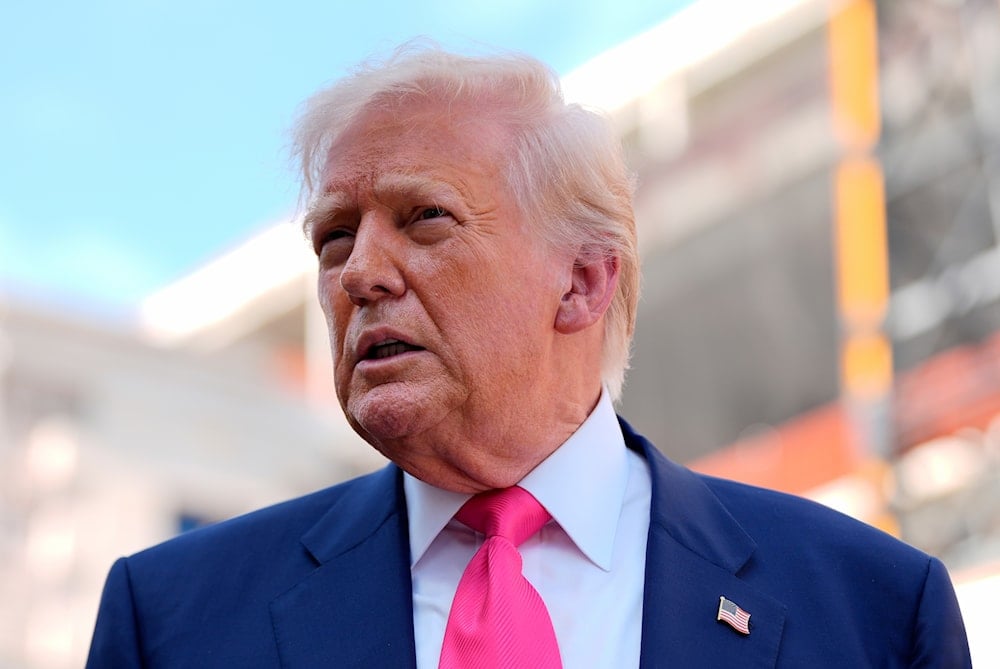Trump threatens sanctions on Russia, though says may not work: NYT
Trump threatens new sanctions on Russia over the Ukraine war, despite doubts about their effect, as secret ceasefire talks fail to yield progress.
-

US President Donald Trump visits the Federal Reserve on July 24, 2025, in Washington. (AP Photo/Julia Demaree Nikhinson)
US President Donald Trump has reiterated his threat to impose sanctions on Russia over the war in Ukraine, though he acknowledged that such measures might not affect Russian President Vladimir Putin's course of action.
A New York Times (NYT) report on Thursday quoted Trump saying, "We’re going to put sanctions," despite the fact that the deadline he gave Moscow to engage seriously on a ceasefire had not yet passed. He added, "Russia? I think it’s disgusting what they’re doing,” apparently referring to ongoing bombings across Ukraine.
Trump’s comments come amid growing frustration within his administration, as diplomatic channels appear ineffective in halting the conflict.
In an interview with Fox News Radio, Secretary of State Marco Rubio revealed that the US held covert talks with Russian officials this week. Though the talks were "not with Putin, but with some of Putin’s top people." Despite these efforts, the discussions made no progress toward a ceasefire.
The report mentions that Trump said he was sending his special envoy, Steve Witkoff, to Russia again, even though a previous visit by Witkoff yielded no results. Additionally, administration officials offered no indication that future engagements would be more successful.
In a rare admission, Trump, long a proponent of economic pressure, acknowledged that sanctions may have little impact on Putin. "I don’t know that sanctions bother him," he said.
From ally to vocal critic
According to the report, Trump’s tone marks a stark shift from his initial stance upon entering office. At the time, he questioned whether Russia was truly the aggressor in Ukraine and appeared to shift blame onto the Ukrainians. Following a highly publicized confrontation with Ukrainian President Volodymyr Zelensky in February, Trump temporarily suspended military aid to Ukraine.
Defense Secretary Pete Hegseth declared that Ukraine would not join NATO, a reversal of stated US policy, and Vice President JD Vance publicly opposed supplying Ukraine with weapons. During that period, Russia remained exempt from most US tariffs.
Over the past six months, however, Trump has shifted course without openly acknowledging a policy change. The report argues that he no longer references his past relationship with Putin and has become increasingly open about his frustrations. Moreover, Rubio says Trump is frustrated that peace talks are often followed by Russian missile and drone attacks.
Questions over Leverage and next moves
On Monday, Trump gave Russia 10 to 12 days to end the war or face sanctions and possibly tariffs on nations doing business with Moscow, so-called secondary sanctions. These could impact key Russian partners, including China, India, and Turkey.
However, implementing such measures could complicate other US interests. Trump is expected to need cooperation from these states on broader geopolitical and economic fronts. Analysts also question that Chinese President Xi Jinping would abandon Putin, his primary strategic partner in challenging US global influence.
In his Fox News Radio interview, Rubio pointed out that the US could pressure Russia by targeting its oil revenues, calling them a “huge part of their revenue.”
According to the NYT report, Russian officials, meanwhile, have dismissed Trump’s warnings. Foreign Minister Sergey Lavrov recently mocked Trump’s shifting timelines. “Fifty days, it used to be 24 hours, it used to be 100 days,” he said. “We’ve been through all this.”
While Democrats urge Trump to consider direct military support to Ukraine, the administration is instead pursuing a plan to sell arms and technologies to European allies, who would then supply them to Kiev.
Trump, who once claimed he could resolve the war in 24 hours through direct talks with Putin, now faces mounting questions over how much leverage the US truly has, and how far he is willing to go to use it.

 4 Min Read
4 Min Read










